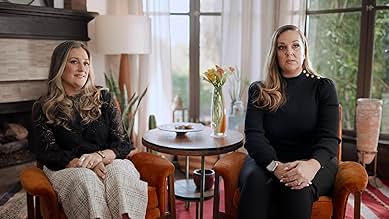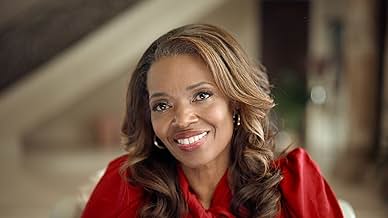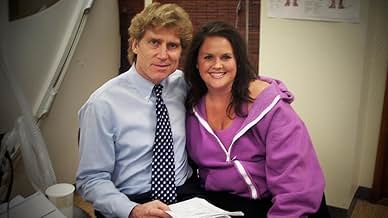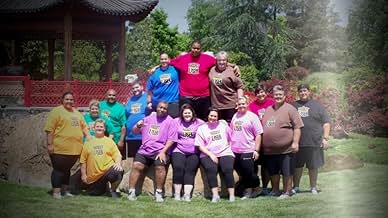Cuerpos de TV: La realidad de the Biggest Loser
Título original: Fit for TV: The Reality of the Biggest Loser
Una mirada entre bastidores del exitoso concurso de telerrealidad, revelando lo bueno, lo malo y lo complejo.Una mirada entre bastidores del exitoso concurso de telerrealidad, revelando lo bueno, lo malo y lo complejo.Una mirada entre bastidores del exitoso concurso de telerrealidad, revelando lo bueno, lo malo y lo complejo.
Explorar episodios
Opiniones destacadas
I watched The Biggest Loser with my wife at the time. Good grief, anyone who had watched the first season knew EXACTLY what they were getting themselves into. They'd seen Bob and Jillian get up in the faces of the contestants, and raise their voices as part of the motivation. ANYONE who was involved in team sports in high school has endured far worse than that. Joelle seemed to lock herself into a power struggle with her coach. She deliberately held back during training sessions as a way of holding onto that little bit of control. Her negative experiences on TBL seem to be rooted in the fact that her personality was completely unsuited for the show. Crying that there isn't "aftercare" for contestants after the show is the most entitled nonsense. Grow up. The program helped you lose a large amount of weight, it's on you to change your life if you want to keep it off. Caffeine as a scandal? C'mon.
This show which could or should have been interesting was just a bunch of click bait. It was a reality show about a reality show. People being mad tv did tv things is comical. I remember plenty of these people having a much different story after the show for years but now they have clearly lost their shine so they are coming back for more.
Honestly it was insufferable seeing Bob Harper and the producers acting as if they did mostly good things and not take any accountability for anything they made these poor people go through.
Anyone trying to lose weight should always exercise at their own pace and obviously should not be made to work out until they throw up and the fact that anyone thought this was okay is wild to me but maybe not too surprising as society does seem to hate fat people and that fact that a show like "The Biggest Loser" was ever a thing proves it.
I wish nothing but the worst for not only Bob Harper and the producers but everyone blaming the contestant in the reviews, still i'm glad that this documentary exists and i hope it opened some people' eyes if they didn't know about this already.
Anyone trying to lose weight should always exercise at their own pace and obviously should not be made to work out until they throw up and the fact that anyone thought this was okay is wild to me but maybe not too surprising as society does seem to hate fat people and that fact that a show like "The Biggest Loser" was ever a thing proves it.
I wish nothing but the worst for not only Bob Harper and the producers but everyone blaming the contestant in the reviews, still i'm glad that this documentary exists and i hope it opened some people' eyes if they didn't know about this already.
The biggest losers here, in my view, are the show's creators - profiting off televised humiliation and suffering while feigning selective memory. David Broome said, "It would be hard for me to comment on the sheriff investigation because I just don't remember it." His co-creator JD Roth strikes me as even more objectionable, with that ever-present smirk as he talks about masterminding the show the way a serial killer might reminisce about their victims.
This is a story of reckless TV executives chasing the next big thing, willing to go to any length to get it, yet unwilling to do the basic work of hiring the right professionals - dietitians, chefs, psychotherapists. They missed the chance to use this platform to teach a nation how to choose better food, cook easy healthy meals, work through unresolved emotional issues, and practice genuine self-care. As someone with a graduate degree in dietetics, I see obesity not only as a physical issue but also a deeply psychological one.
The documentary touched on manipulative and unethical challenges, the toll on contestants during and after filming, and the long-term damage, from slower metabolisms to chronic ailments. But it failed to widen the lens to the real backdrop: America's obesogenic environment, where unhealthy, ultra-processed foods are cheaper and more accessible than their healthier counterparts. These sugar- and fat-laden products are exactly what emotional eaters, or those chasing a dopamine hit, are drawn to.
I wish the documentary had gone deeper into how each former contestant ended up at their starting weight and what was going on in their inner world. I suspect the common thread would have been self-loathing and negative self-talk. Tracey Yukich put it best: "You need to cheer for yourself... The show didn't change my life. I changed my life. I did that."
This is a story of reckless TV executives chasing the next big thing, willing to go to any length to get it, yet unwilling to do the basic work of hiring the right professionals - dietitians, chefs, psychotherapists. They missed the chance to use this platform to teach a nation how to choose better food, cook easy healthy meals, work through unresolved emotional issues, and practice genuine self-care. As someone with a graduate degree in dietetics, I see obesity not only as a physical issue but also a deeply psychological one.
The documentary touched on manipulative and unethical challenges, the toll on contestants during and after filming, and the long-term damage, from slower metabolisms to chronic ailments. But it failed to widen the lens to the real backdrop: America's obesogenic environment, where unhealthy, ultra-processed foods are cheaper and more accessible than their healthier counterparts. These sugar- and fat-laden products are exactly what emotional eaters, or those chasing a dopamine hit, are drawn to.
I wish the documentary had gone deeper into how each former contestant ended up at their starting weight and what was going on in their inner world. I suspect the common thread would have been self-loathing and negative self-talk. Tracey Yukich put it best: "You need to cheer for yourself... The show didn't change my life. I changed my life. I did that."
The documentary itself is not bad. It's entertaining and has some not bad stories.
However, what bothers me is the narrative: A bunch of whining Americans, who knew exactly what they were signing up to and got that exact thing. You couldn't say you didn't know! Ok for season 1 or 2, but all following seasons? You didn't watch it? What are you whining about? You wanted this! This is a TV show meant to create ratings and interest. You want to lose weight by yourself, go hire a trainer and a nutritionist and don't sign up to a TV show and then whine endlessly.
However, what bothers me is the narrative: A bunch of whining Americans, who knew exactly what they were signing up to and got that exact thing. You couldn't say you didn't know! Ok for season 1 or 2, but all following seasons? You didn't watch it? What are you whining about? You wanted this! This is a TV show meant to create ratings and interest. You want to lose weight by yourself, go hire a trainer and a nutritionist and don't sign up to a TV show and then whine endlessly.
Selecciones populares
Inicia sesión para calificar y agrega a la lista de videos para obtener recomendaciones personalizadas
Detalles
- Fecha de lanzamiento
- País de origen
- Idioma
- También se conoce como
- Fit for TV: The Reality of the Biggest Loser
- Productora
- Ver más créditos de la compañía en IMDbPro
- Tiempo de ejecución
- 2h 4min(124 min)
- Color
Contribuir a esta página
Sugiere una edición o agrega el contenido que falta

































